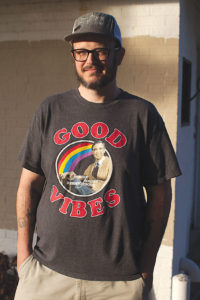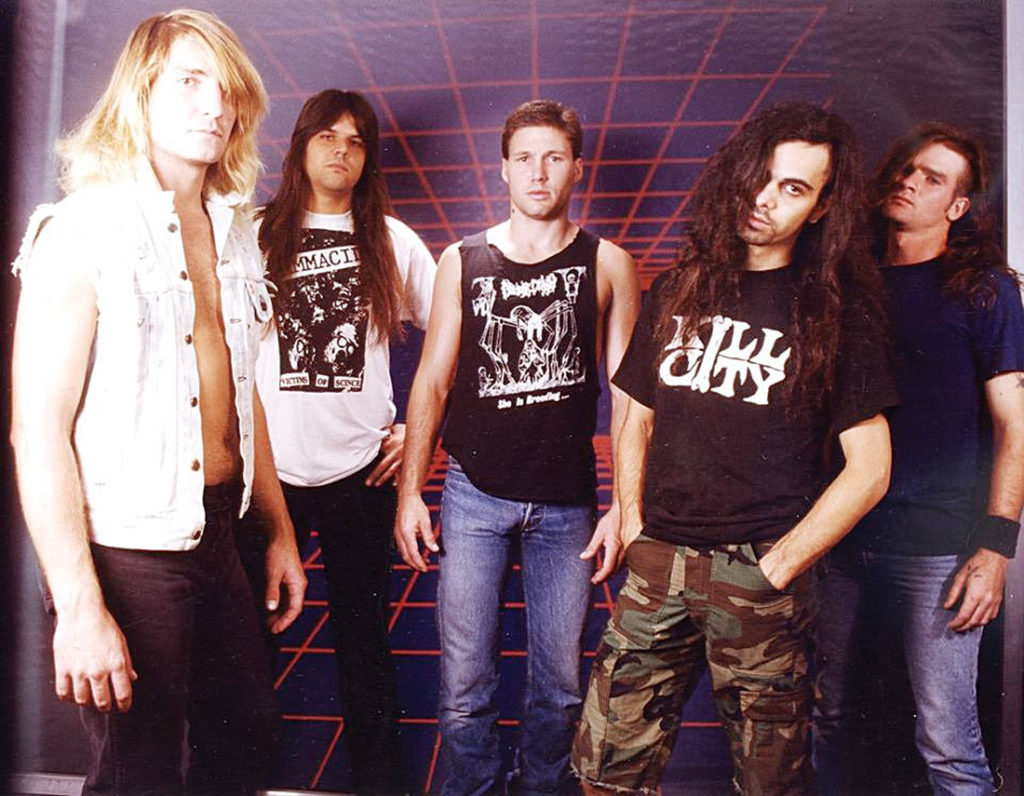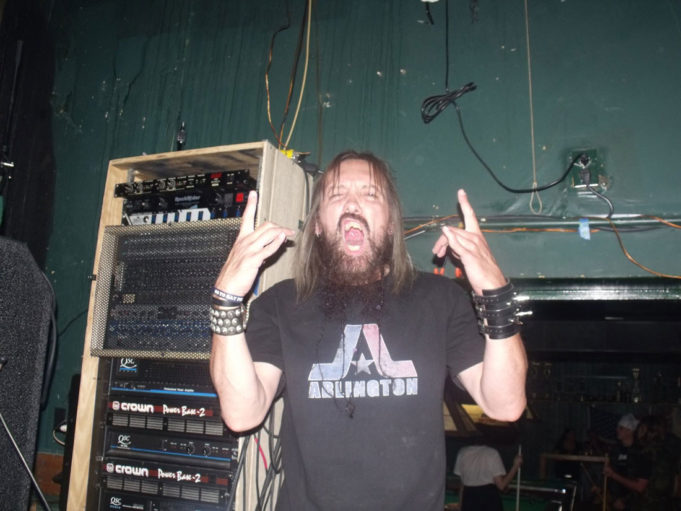Though decades removed from its peak in the early ’90s, the Fort Worth heavy metal scene still refuses to crawl into the proverbial pine box –– at least that’s the perception in certain circles. With fewer and fewer clubs keeping pointy guitar-slingers as a regular attraction, the diehards still manage to keep their head-banging neck muscles in shape by seeking out their thing in whatever dives and watering holes it can be found. A few best metal band nominees and a longtime scene vet were kind enough to share their thoughts on the state of the dark art and where it’s still practiced in Panther City.
Jerry Warden, the self-described Godfather of the North Texas Metalplex, is a longtime player in metal circles going back to the ’80s. He now owns the concert promotion company Elmo Jones Productions and is the talent buyer for Diamond Jim’s in Arlington, a metal hotspot. Michael Huebner has played in heavy staples such as Hellgoat and Alcohollica and is the guitarist for Life of Scars. Rick Perry’s guitar resume includes iconic local metal bands like Warlock, Gammacide, Puncture, and Warbeast. He currently shreds for Iron Jaw. Mark Kitchens is drummer/keyboardist for doom duo Stone Machine Electric and is also a member of Momentary Gamelan Ensemble. Darren Miller is singer/guitarist of newcomer thrash outfit Ox Combine.
Fort Worth Weekly: How do you feel about the general health of the metal scene in Fort Worth right now? How does it compare with years past?
Warden: The metal scene in Fort Worth appears lackluster. The current appreciation, buzz, and involvement doesn’t equal the fervor of places like Heavy Meadows, Rascals, The Tombstone Factory, Joe’s Garage, or Hotel Hell [in the ’80s].
Heubner: I have no idea if the crowds are up or down right now. The Life of Scars shows are doing pretty well. It doesn’t come anywhere close to the ’80s or ’90s, but we are getting old and new generations bringing in new things.
Perry: Back in the ’80s, the Fort Worth metal scene was amazing. It was not unusual for local bands like Gammacide or Hammerwitch to draw 300 or 400 people to local clubs. Nowadays, our fan base is older, and there are less of them coming out to shows, but they are still very passionate about the music.
Kitchens: I know the doom/stoner scene is pretty healthy at this time, maybe even a little oversaturated.

Metal bands largely fly under the radar of many concertgoers and the music press. Is there something inherent in the music that narrows its appeal, or are we writer nerds just not paying enough attention?
Warden: Most people do not casually listen to metal. It’s an extreme form of rock music, and as such, you either love it or hate it. There’s very little middle ground.
Perry: Metal has never been fashionable, and that’s fine with me. I think it could actually hurt the scene if metal suddenly lost its ‘outsider’ status.
Miller: Press not paying enough attention? That’s pretty much been the case for most of metal’s lifetime. It’s always been more of a word-of-mouth, tape-trading, ‘Did-you-hear-this?’-type of genre – just like punk.
Now that The Rail has imploded, another metal-focused venue has shut its doors. Are there still enough places that regularly book metal bands?
Warden: There’s never enough venues for metal, but Diamond Jim’s Saloon is the best club in the DFW Metalplex. And it’s in Arlington, the birthplace of metal in the DFW.
Perry: It sucked when The Rail shut down. That was a very good venue for metal. But there’s still many clubs and venues in Fort Worth. Ridglea Theater has three different rooms, all of which host metal shows frequently. Tomcats is solid on the Westside of Fort Worth and fills the gap left by The Rail. Lola’s has some of the heavier bands from time to time. And Diamond Jim’s in Arlington hosts underground metal tours on a regular basis.
Kitchens: I’ve not had issues booking shows since we’ve never really relied on playing The Rail. We played a few shows there years ago, but I never felt welcomed there.
Do you think there’s a general reluctance by clubs to book metal bands?
Warden: There is a reluctance of club owners willing to book metal because very few club owners are metalheads. If the owner isn’t a metalhead, they are usually steeped in the negative stigmatism of metal music.
Perry: I think club owners think live music is a big pain in the ass, period. And it is. With a bunch of musicians loading their gear in and doing sound-checks, hiring a soundman and P.A., guest lists, et cetera, it’s a wonder that any clubs bother with it at all.
Kitchens: I don’t know about typical metal shows, but stoner/doom shows are just fucking loud. That can scare away unsuspecting patrons.
Do you see any benefit for bands playing crossover shows in an attempt to turn on new fans who maybe don’t have a palate for the genre? Or is it better to just keep growing the faithful?
Perry: The idea of metal bands sharing the stage with regular rock bands or even pop or rap bands is not appealing to me, and I doubt that any metal bands that did this would expand their audience. It’s better that we stick to our own and headbang ourselves into toothless obscurity.
Kitchens: I think it would be great for a promoter or venue to put together an eclectic bill that showcases the DFW scene as a whole. That would be very challenging.
Miller: Absolutely. No question about this. The same vibe for punk or rap carries over. It’s all about how intense and genuine it is.

Is there a division between old-school thrash/grindcore bands and the newer stoner/doom bands? Are stoner/doom bands even metal?
Warden: There’s as many new thrash/death metal bands as new stoner/doom bands, and most members of each sub-genre support each other. Stoner rock is not as extreme as thrash/death and therefore would appeal to more of a mainstream audience. Most bands of either style respect and appreciate each other for flying the metal flag. The original metal band, Black Sabbath, was a stoner/doom metal band, and who doesn’t love Black Sabbath?
Heubner: I’ve played in both types of bands and don’t see a division. The stoner/doom music is less angry, so more mass appeal.
Perry: I like thrash and doom. Doom metal has been more hip and happening for a while, and some of it is less abrasive and a little groovier, I guess. But stoner/doom bands have their roots in Black Sabbath, which is the source of all metal. I think the doom scene has been pretty oversaturated for a while. Pretty soon other types of metal will thrive.
Kitchens: There’s a metal subgenre for everything. I’d like to think there’s no division between any scene, but there are assholes everywhere, including me. Me saying thrash is irrelevant is like me saying Black Sabbath is irrelevant.
Metalheads are by far the most loyal of any fanbase. What accounts for this?
Warden: Metal is an extreme form of rock music, so it’s only natural the fans of our extreme artform are extremely passionate. Extreme music equals extreme passion.
Perry: Since the mainstream media ignores or scorns metal, and since mainstream music fans find it too heavy, or too cheesy, or too satanic, or too whatever, I think when a metal fan latches onto a band that they like, it becomes ‘theirs.’
Kitchens: Birds of a feather. It’s your friend in that other band. You want them to succeed. Metal has always been an underdog, and you want it to be that way.













Hey my head banging roommate, looks like your doing good keep up the great work Rock on brother